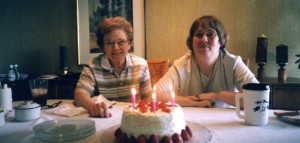Mimi and Dona
My new caregiving friend, Ilonka Michelle O’Neil, recently recommended a touching and poignant documentary to me and I am honored to share it with you through her words.
What will happen to my child when I am no longer able to care for him/her? This is a question that weighs heavily on the minds of parents whose children have developmental or intellectual disabilities. Unthinkable for most, it is not uncommon for parents with children with special needs to secretly pray that their child will die before they do. The thought of what will become of their beloved son or daughter after they are gone competes with the excruciating thought of losing them.
For many caregivers, there is an end in sight. As was the case with Lauren Simon, author of When You Feel Like Strangling the Patient, her husband’s goal was full recovery. For others caring for aging parents or terminally ill relatives there is also an end in sight although a sad one. Eventually the loved one dies, and while there is grief, the physical and emotional toll of caregiving has ended and healing can begin.
For many parents, once their child ages out of the public school system, there is little support. These parents look out at the prospect of decades of full-time caregiving for their adult children, until they can’t do it.
Filmmaker Sophie Sartain’s poignant documentary Mimi and Dona explores the role of the long term caregiver, and what happens when one woman, in her 90’s is no longer able to care for her intellectually disabled 64 year old child.
http://www.mimianddonamovie.com
Of Lauren Simon’s work Sartain says,
“Caregiving can be so hard and isolating and relentless. I appreciate that Lauren could be so honest about how much of a struggle it can be to be a caregiver. There are many unsung heroes out there. The people who put in these hours, day in and day out, year after year, are mostly unpaid. They often have to curtail their own dreams and end up losing work.They are everywhere, and we often don’t acknowledge them enough.”
Writer Elizabeth Aquino’s daughter has severe epilepsy and an intellectual disability. She will be aging out of the public school system soon. Of Sartain’s film she says,
“Mimi and Dona is important because it highlights the significant impact of caregiving for disabled families over generations. The film does a beautiful job showing both the positive and negative aspects — the incredible love and compassion of family toward the disabled member, as well as the difficulties navigating systems of care for their loved one and the lack of supports available.”
Sartain says of her film,
“If we can bring awareness about these super parents and these wonderful families and caregivers out there, and the work that they do, and the love that they show over the years, I would be happy for that to be a result of the film.”
Author Ilonka Michelle O’Neil is the parent of a child on the autism spectrum and teaches yoga to parents of children with special needs, and other caregivers. She lives in South Florida.


Excellent article on a subject of which not enough has been made.